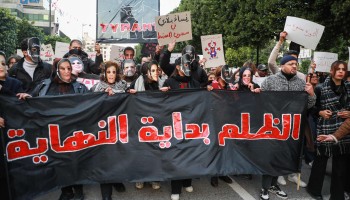Human rights activists, lawyers, LGBT people, children, and women have all faced repression in Egypt’s decades-long human rights crisis. In the latest escalation, authorities have since July 2025 been targeting social media influencers, including TikTokkers, vloggers, belly dancers, and tattoo artists, citing “family values” and “public morals.”
“Egyptian authorities’ campaign against online content creators seems intended to quell the last vestige of space for free expression in the country,” said Amr Magdi, senior Middle East and North Africa researcher at Human Rights Watch (HRW), in the organization’s latest report.
According to the Interior Ministry, between late July and late August, at least 29 people were arrested or prosecuted for online content, including 19 women and a child. Egypt-based independent media outlet Mada Masr recorded eight additional cases, bringing the total to 37.
All face charges of violating public morals, some for allegedly using “indecent language.” The arrests disproportionately target women, with four belly dancers cited for their clothing.
Magdi told OCCRP that these pervasive and systematic abuses are weaponized by the government not only to maintain the status quo but also to “appeal to certain segments of the society as protectors of morality or protectors of religion.”
He added that the announced number of arrests is “only a fraction of the reality.” With no transparency from the government, families of the detained and forcibly disappeared are too intimidated to report cases or seek help from human rights lawyers. Many fear that doing so could further complicate their situation, especially amid a wider crackdown on rights lawyers and organizations.
Their fears are well-founded. The Egyptian government has a documented record of deliberately targeting not just human rights defenders but also their family members “as a form of reprisal,” subjecting them to unfair trials, years-long pretrial detention, and indefinite imprisonment.
The Public Prosecution has confirmed only 10 cases, but independent documentation suggests a far larger pattern. The Egyptian Initiative for Personal Rights recorded more than 151 cases in the past five years, reflecting only those it handled directly.
The July arrests, Magdi explained, are “an intensification of a very long, protracted campaign against social media influencers and in the name of protecting morality or public order.”
“It’s just an intensification of a daily reality that Egyptians live under very draconian laws and a very draconian policy,” he said.
Magdi also highlighted the severe campaign against LGBT people, describing it as “very, very harsh” and “never seen before” under previous regimes. Authorities reportedly create fake accounts on gay dating apps to entrap and arrest individuals, a practice ongoing for years.
Children have not been spared from such abuses. In late August, rights groups condemned the government after security forces arrested and forcibly disappeared at least 15 children, some as young as 12, for playing the online game PUBG. Police allegedly lured them with in-game rewards to join messaging groups or share content, which authorities later used as evidence to charge them with terrorism-related offenses.
“All of this constitutes a larger pattern in which the government seeks to control society, also when it comes to the social upheaval that is usually hidden from media, hidden from mainstream reporting,” Magdi said.






